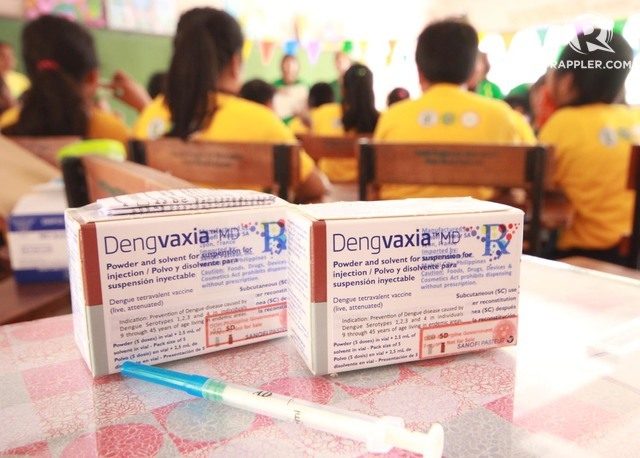SUMMARY
This is AI generated summarization, which may have errors. For context, always refer to the full article.

MANILA, Philippines (2nd UPDATE) – Health Secretary Francisco Duque III has ordered the suspension of the school-based dengue vaccination program, following concerns over the risks posed by the Dengvaxia vaccine to those without prior infection.
“The DOH will place the dengue vaccination program on hold while review consultations are ongoing with experts and key stakeholders,” Duque announced in a press conference on Friday, December 1. (READ: Vaccinated Filipino youth now at risk of getting severe dengue)
This follows an advisory of French pharmaceutical giant Sanofi Pasteur that its Dengvaxia dengue vaccine could cause more severe cases of dengue if administered on a person who had not been previously infected by the virus.
The Food and Drug Administration will also stop the sale of Dengvaxia in the Philippine market, until Sanofi replaces its packaging label to reflect their new warning.
The school-based vaccination program was launched in April 2016 by then-DOH chief Janette Garin under the presidency of Benigno Aquino III. The target was over one million 9-year-old students enrolled in public schools in the National Capital Region, Central Luzon, and Calabarzon. (READ: TIMELINE: Dengue immunization program for public school students)
A whopping P3.5 billion was spent for the program, funded through sin tax revenues. The DOH already paid this amount in full to Sanofi.
Duque said on Friday that as of November 2017, 733,713 children ages 9 and above received the first dose of the dengue vaccine in the 3 regions.
But he allayed fears of parents who are worried about their children who had been administered the vaccine, particularly those with no prior infection. Duque said Dengvaxia has a 30-month protection period against dengue, regardless if the child had prior infection or not.
“Batay sa kanilang (Sanofi) karagdagang impormasyon na ating nakalap kaninang umaga noong nagmeeting, nagpulong ang execom (executive committee) ng DOH, ‘yong protective benefits ng Dengvaxia, first dose sa lahat, que nagkaroon ng dating impeksyon o hindi pa nagkaroon ng impeksyon, meron siyang 30-month protective period,” he said.
(Based on Sanofi’s information that we were able to gather when the DOH’s executive committee met earlier, Dengvaxia’s protective benefits – whether you were infected by the virus before or not – include a 30-month protective period.)
In the next 5 years, DOH will closely monitor all the children who were given the dengue vaccine. Duque said parents will be required to give information on the vaccination history of their children. Supportive care will be given to children who will get sick.
The DOH will also closely keep watch over all cases of children admitted to hospitals.
The Philippines is one of 11 countries that approved the commercial release of the vaccine. In Asia, the other countries are Singapore and Thailand. – Rappler.com
Add a comment
How does this make you feel?
There are no comments yet. Add your comment to start the conversation.